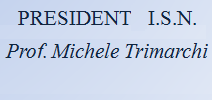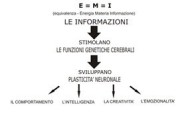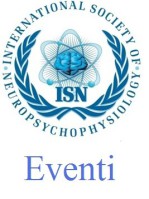SPECIALIZATIONS AND INTEGRATED SCIENCES
Michele Trimarchi
The brain and integrations of science , n. 2, 2nd half year, 1983
The need feel to ever greater extent for a renewal of the scientific culture has hastened the search for overcoming the obstacles imposed by the too rigid regulations of the various scientific disciplines.
Philosophers, epistemologists, physiologists, etc. are looking for new ideas and new research possibilities, insofar as the way followed by experimental sciences is saturated and does no longer offer changes to solve the manifold problems since the results achieved by the different disciplines are not always integrable each other and hence they are not useful to explain social and human phenomenologies. As we all know, every social and environmental phenomenology is interdependent, therefore, the causes of certain situations of disequilibrium often lie in totally different contexts. We cannot continue to work in order to achieve social recovery projects I f we do not achieve first an integrated science that offers parameters of objective evaluation.
The way we propose and that many scientists is in the world are following is the way of the integration of sciences. Our studies are in fact developed through interdisciplinary methods aimed at finding out scientific answers that are no more specialized but rather integrated with those phenomenologies we often ascribe to “chance” since they are not understandable through mere specializations.
For instance, the chemist within CEU seeks in his investigation field for those aspects that, seen only from the point of view of the specializations usually remain without a goal but that, submitted to the biologist, can concur to verify how these experiments find their proper place in order to explain chemical processes of biological systems, so as to bridge the gap between the specializations and the objective integrated knowledge.
All the other specialists co-operating with CEU have the same task.
We have been allowed to state that in the various scientific fields there are results that cannot be used and that often are not even understood just because they work on their own investigation model and the ground to understand them is in another research field. Due to the mechanism inherent in the super-specializations with their intrinsic aims governed by absurd rules we cannot, according to the specialistic model, invade other investigation fields.
This is a paradox today we are trying to overcome thanks to multidisciplinary works and trough our integrative action.
Neurosciences have not yet succeeded in giving an ultimate explanation on the memorization process of information on the part of the central nervous system, but we have electronic engineers who are achieving “biological memories”. Some physicists have discovered the existence of metallic dusts endowed with a sort of “memory” and by now we have certainly acquired that the simplest cell has a genetic dynamic memory.
This helps us to demonstrate that, if we bring together the physicist who has worked on the dusts with memory, the genetist who explains the dynamic process of genetic memories, the electronic engineer who shows how he reached experimentally the possibility to realize a “biological memory”, we discover “by magic” that the whole Universe has its memories. This is just an example of how much we have to work so as to discover what we have until now discriminated thus achieving an anti-human world as well as an anti-human knowledge.
This will enable us to widen the investigation fields in order to create a controlled science in favour of both men and societies.
We all are aware of the damages engendered by certain chemical substances on the biological world, not to speak of the damages that given information provoke on entire nations. This let us understand that the projects aimed to social treatment must be carried on in a global way rather than to continue to try to stop up by means of pseudo-solutions the avalanche that is about to submerge the whole humanity. It is necessary to stop thinking there will always be a “pill” to solve our problems since pills, as everybody knows, always produce side-effects which, added together, will destroy all of us.
It is up to us, men of science, to prevent damages because society cannot defend itself from what it does not know, but rather it can only undergo what the “technological” specializations often cause.






